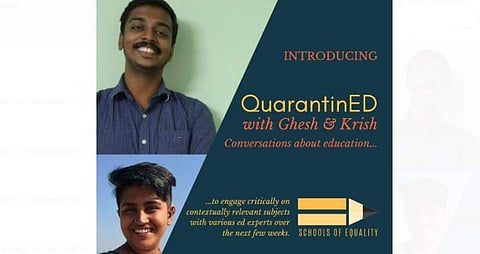

When the pandemic struck, the government's first decision was to shut down all schools across the country. Top schools including international ones immediately made it their priority to switch to online classes. That was when the real divide between the privileged and the underprivileged came out because for the low-income schools, the first priority became food. It was after witnessing this that two educators decided it was time to address the issues that plague education in this country.
Krishna Kala Baskaran, a school teacher and school administrator and Gheshna Nagendran of the Schools of Equality decided that since the pandemic has kept everybody under lock, this would be a good time to start conversations on education. Krishna has been working with government schools for the last four years and Gheshna's organisation conducts activities to encourage students to learn about equality in gender, caste, class and Gheshna has been a part of Schools of Equality for the last three years.
Krishna and Gheshna met a while ago during an event organised by Schools of Equality on caste in schools. "We have been wanting to organise some seminars and initiative conversations since we met. And then when the pandemic struck, we saw how wide the gap is between private schools and government/low income schools. That's when we felt the immediacy to starting these conversations right away,"
The duo have decided to hold a session every week till the end of May. They've had one session so far and the theme of the session was a discussion on how low income schools were coping with the pandemic. The sessions are help on the now popular Zoom App and the duo invite activists, educations and experts to participate in the interaction. Last week, they had education activist, Prince Gajendra Babu, Prema Revathi and Nisha S who both run schools for children from low income groups.
"We discussed what the pandemic means for low income schools. Because right now, international schools and big private schools have switched to online classes pretty smoothly. but with government schools and low income schools, it is a totally different scenario. The latter were struggling for basic survival. Learning isn't the first priority, food and shelter is," Krishna said.
Prema Revathi, one of panelists who we had spoken to earlier for another story has been raising funds and arranging food for her students and their families as they are all mostly for a marginalised section. Going back home from he residential school meant the they may struggle for food, which is why Revathi and her team took it upon themselves to help food reach the homes of their students.
Krishna recalled what Prince Gajendra Babu, the General Secretary of the State Platform for Common School System said during their session as well about how the pandemic has derailed education in India. "He said that the bench mark we had set for education has changed. We have to use this moment to advocate new ideas," he said.
"Things changed so quickly the difference between the two worlds was glaring. Here, we were trying to reach out to parents. Here even the teachers are sometimes from the same communities that are marginalised and oppressed, so the teachers also need support. So arranging classes during this time is impossible," Krishna said. The saddest thing is, one of panelists, Nisha said was that nothing would really change even after the lockdown. "The privileged schools will quickly adapt and the low income schools will battle the same issues it already had. This pandemic has just magnified the inequity that exists in the education system," he added.
The duo are planning on documenting the sessions and possibly brining out a booklet of the recommendations. "We are still working on that but basically we want to compile the insights that the experts have. We have to get these insights out in the public domain so people realise that these are the problems we are facing," he explained.
For their first session, the team had almost 50 registrations and they are hoping for more for their next session on mental health in schools. "We got a lot of questions regarding mental health in our previous session so we decided to make that the topic of our next session," the teacher said,
"The first leg of the session will deal with the effect of the pandemic on schools, the second part will focus on broader issues like health and education or caste and education. Our next session will deal with mental health of students and also how to deal with the whole situation when the lockdown ends and the children return to schools," he tells us.
